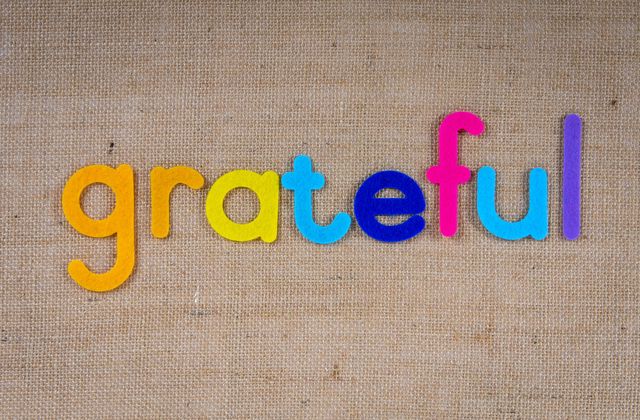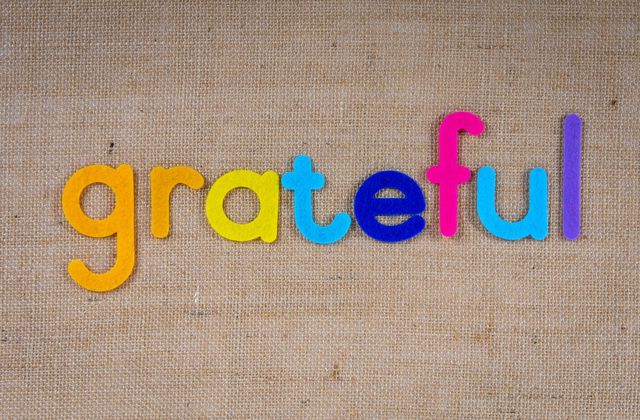
In November, you will see many people observe a month of gratitude on social media. Every day, they will share something for which they are thankful. It is often accompanied by a comment and a picture. I do not do it every year, but I have done it in the past.
It is a practice I highly recommend for many reasons. Think about how you usually wake up in the morning. Fairly soon, you are thinking about the appointments of the day or the items on your to-do list. During November, along with all those other thoughts, you are reminded, as the day unfolds, to seek out things for which to be thankful. As you do this for more than just a day or a week, it can begin to have a cumulative impact. Gratitude becomes a daily practice, instead of something we think about from time to time.
But this year, I find myself wondering if gratitude can be more than a spiritual practice. Can gratitude be more than something we do? Can It be something we are?
Can it become the core, the center, and the driving force or energy of our personhood? Perhaps human beings are called to be grateful creatures. Perhaps we are not living out fully who we are as human beings until we live out of this place of gratefulness.
Even the language we use can make a difference. It feels like there is a difference between gratitude and gratefulness. Both words come from a Latin word that means pleasing, agreeable, or pleasant. But I like the ‘ful’ part of gratefulness. This sense that gratitude and thanksgiving can fill me up.

Brother David Stendl-Rast, a Benedictine monk, shares these thoughts about gratefulness:
The clue lies in the fact that any given moment confronts us with a given reality. But if it is a given, it is gift. If it is gift, the appropriate response is thanksgiving. Yet, thanksgiving, where it is genuine, does not look primarily at the gift and express appreciation; it looks at the giver and expresses trust. The courageous trust in the Giver of all gifts is faith. To give thanks even when we cannot see the goodness of the Giver—to learn this is to find the path to peace of heart.
A Listening Heart, 4
“The clue lies in the fact that any given moment confronts us with a given reality. But if it is given, it is gift.”
It is easier to be grateful when the gift is handed to us by the giver, wrapped in fine paper with ribbons and bows and a card with our name on it. But most of life’s gifts are offered to us as part of the common, the ordinary, the everyday, even the mundane.
The first light of dawn and the face of our beloved lying next to us. The warmth—or coolness—of the water from the shower as we move about so it can touch every part of our body. The explosion or taste from biting into a simple piece of fruit or a luscious dessert. The songs coming from our car stereo that we sing along with as we drive to work.
The rich humanity of co-workers, clients, clerks, and strangers that fill up our day. The straining and sweat of our bodies as we exercise. The inviting laughter of children. The profound depth in moments of centered silence. The gentle but steady light of the moon that follows us on our evening walk. The warmth of the covers that we pull over our tired bodies. All these moments make up the setting in which we live out our lives. And yet, all of them are the “givens” of our lives. And as Brother David says, if they are givens, then they are gifts and there is a Giver.
“Yet thanksgiving, when it is genuine, does not look primarily at the gift and express appreciation; it looks at the giver and expresses trust.”

How different would our lives be if we spent less time focusing on the gift and more time focusing on the giver? What would it be like to focus on the grower of the fruit or the maker of the dessert, the writer and singer of the song, the wonder of the people who cross our paths, the maker of the silence and the moon? What would it be like to spend less time thinking of how delightful it is to receive a gift and more time thinking about what was going on in the heart of this mysteriously wonderful person that led them to share with you in this way? To wonder what part of this person’s heart and soul is represented by the gift you hold in your hand?
“To give thanks, even when we cannot see the goodness of the Giver—to learn this is to find the path to peace of heart.”
Real gratefulness is more than the simple exercise of counting our blessings. If gratefulness is the force or energy that gives birth and gives meaning to everything in our lives, well, that means everything. It includes all of those things that we don’t want to welcome or embrace, all of those things that don’t seem to have anything to do with the “goodness of the Giver.”
Henri Nouwen shares these words:
We are really grateful for all the good things…We simply have to accept or try to forget the painful moments.” The attitude expressed in these words made me aware of how often we tend to divide our past into good things to remember with gratitude and painful things to accept or forget. Once we accept this division, however, we quickly develop a mentality in which we hope to collect more good memories than bad memories, more things to be grateful for than things to be resentful about, more things to celebrate than things to complain about. But this way of thinking, which at first glance seems quite natural, prevents us from truly allowing our whole past to be the source from which we live our future. Is this the gratitude to which the Gospel calls us?
“All Is Grace,” Weavings, November/December 1992, 39
Is it really possible to embrace with gratefulness all of our life and not just the good things we want to remember? When gratefulness is a force, a spirit that gives life and meaning to everything that happens to us and in us, then we can be open “to recognize that gladness and sadness are never separate, that joy and sorrow really belong together, and that mourning and dancing are part of the same movement” (Nouwen, 39). With Nouwen, we can learn than “the call to [gratefulness] asks us to say, ‘everything is grace.’ When our [gratefulness] for the past is only partial, our hope for a new future can never be full” (Nouwen, 40).
